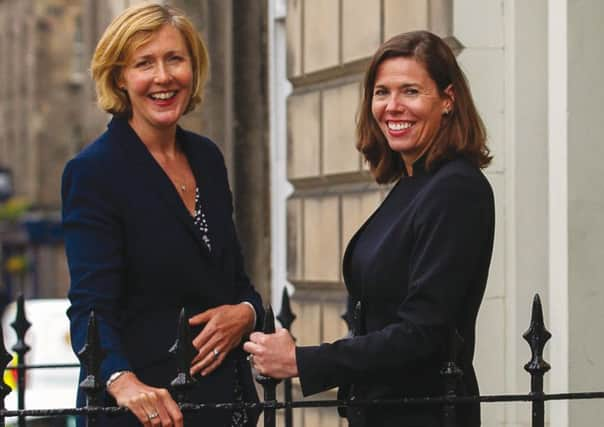‘Fintech figureheads’ key to attracting talent to Scotland


When attracting talent in a fast-moving and constantly evolving sector like fintech, deep and detailed knowledge of market dynamics is absolutely essential.
Edinburgh-based firm Carlyle, which has significant experience of hiring senior individuals for both the financial services and tech sectors, is the leading search and interim specialist in Scotland’s fintech space, and the firm understands the need for “intimate market knowledge”, as managing partner Carol-Ann Searles describes it.
“We have been the go-to search partner for some time for a number of large financial services institutions in Scotland and further afield,” she says.
“We also have great strength in technology, working with the likes of FreeAgent, ZoneFox [bought last year by cyber security giant Fortinet] and CodeClan. We worked closely with the board at CodeClan to secure Melinda Matthews-Clarkson as their new CEO, and we are currently in the process of recruiting a CEO to succeed Polly Purvis at tech trade body ScotlandIS.”
Searles continues: “Because we have real strength in tech and financial services – from start-ups to big banks – we have a unique view across both environments.
“Also, having built a firm reputation in Scotland over more than a decade, our London office is now providing a very effective talent bridge.
“There is real interest from our clients in London-based talent; 80 per cent of the people we are engaging with for senior roles in Scottish-headquartered businesses are in the London area, so it’s very important for our clients that we have a presence there.”
Carlyle’s presence in the UK Capital could go some way to resolving one of the conundrums faced by fintech in Scotland – how to recruit the thousands of skilled people needed by the rapidly growing sector north of the Border.
Carlyle’s founding partner Duggie Carlyle thinks that part of the answer could be “fintech figureheads” – high-profile and highly-skilled people who can attract talent pools around them.
“The research done by industry bodies such as Scottish Financial Enterprise says we need thousands of new people in the next ten years,” he says. “It’s a real challenge, but what we have clearly observed is that by introducing one or two highly respected leaders into a geography, other talent inevitably follows.
“Ten influential people could be the catalyst to attracting thousands more, which is why we feel our responsibility as a firm is much greater than simply recruiting for senior roles.”
Data
Fiona James-Martin, a fellow Carlyle partner, agrees. “In the data age, we can more accurately track not only the number of senior placements, but their success,” she says. “We’re beginning to collect more data which shows that precision hiring, ensuring the right person in the right role at the right time, has significant long-term effects on our clients’ businesses.”
The diverse skill sets required in fast-growth businesses are increasingly being provided by experienced figures who want to work in disruptive and fast-paced environments.
Carlyle explains: “There are growing numbers of senior, highly skilled executives who want to work at an impactful level, but who don’t necessarily always want to undertake a permanent role.
“Many have had successful executive careers but now choose to work in shorter-term engagements. Others have four or five consultancy assignments running at the same time.
“These people are providing cross-fertilisation between financial services and technology, which is really valuable. One of the results of this is that large companies are increasingly supportive of their leadership teams having outside interests.”
James-Martin adds: “We’ve seen numerous positive commercial outcomes when a large business brings in talent from a smaller and more nimble company, and vice versa.”
The emergence of this group of skilled individuals with a broader industry perspective – and a desire for complex challenges – is driving growth in Carlyle’s sector-leading interim practice.
In a world where, in the words of Canadian Prime Minister Justin Trudeau, “The pace of change has never been so fast, yet it will never be this slow again”, the speed of hiring talent can be make-or-break for a business.
However, Carlyle provides a solution via its senior interim practice, which enables the short-term placement of experienced executives.
“We responded to client need by developing a senior interim offering that can bring people in very quickly on a non-permanent basis,” says James-Martin.
“Fast-moving businesses simply cannot wait six to nine months to get someone into a key role and large businesses are realising the opportunity cost of not having the right person in post right now.
“We can also help address this through our trademarked Parallel Search offering, which enables us to recruit an interim individual quickly while searching for a permanent solution.”
James-Martin goes on to add that this challenge can be easier to overcome for small fintech businesses: “They are more agile, with less laborious processes, and can make faster decisions and faster hires.”
Cross-fertilisation between young, agile fintechs and larger, established financial services institutions is maturing and Carlyle is seeing this across its three key business areas – its core executive search practice, interim practice and board practice.
Duggie Carlyle believes there is a real opportunity for smaller fintechs to attract heavyweight senior talent, in both executive and non-executive roles.
He says: “What a lot of smaller firms don’t realise is that, if they have a strong business, they can attract some hugely experienced names on to their board who have decades of expertise in relevant sectors.
“[Smaller firms] first instinct is that such individuals would not be interested, but often these people want to give something back and do something different.
“We can act as a conduit for scaling companies to engage with senior people who can make a substantial impact on their business. That’s the real value inherent in our knowledge and expertise across both financial services and technology.”